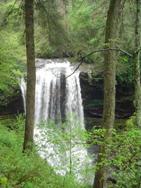- Academic Programs & Support
- Departments, Schools & Colleges
- College of Arts and Sciences
- Sciences and Mathematics
- Biology Department
- Biology Facilities
- Southern Appalachian Biodiversity and Ecology Center (SABEC)
Southern Appalachian Biodiversity and Ecology Center (SABEC)

The Southern Appalachian Biodiversity and Ecology Center (SABEC) promotes collaboration within Western Carolina University, with Highlands Biological Station, and with other regional institutions in education, research, and outreach focused on ecology and biotic diversity in the mountain ecosystems of western North Carolina and surrounding areas.
Biology and natural resources management faculty, WCU graduate and undergraduate students, regional organizations, scientists at other institutions, and teachers in regional public schools participate in SABEC activities.
SABEC activities include research grant proposals, collaboration with public schools, student research projects, and collaboration with institutions such as the N.C. Natural History Museum.
SABEC Activities
- Eric Dodson (J. Bugden-Storie, advisor) – development of a primer for on-line mapping
- Jody Harkey (K. Catley, advisor) – web location effects on a social spider
- Joe Huguelet (K. Mathews, advisor) – clonal diversity of rivercane stands
- Andrew Lawson (J. Bugden-Storie, advisor) – mapping NC coastal wetlands using polarimetric radar data
- Mark Roloff (P. Bates, advisor) – fire effects on forest regeneration
- Jamie Tidmore (S. O’Connell, advisor) – soil bacterial diversity
- P. Azamghavami, Jacob Bolick, Michael Foster, Laura MacCall, and Leslie Waldrun (J. Pechmann, advisor) - ecology of herpetofauna
- Bill Donaldson and Emily Willard (R. Davis, advisor) – eastern box turtle habitat use
- N. Allman (B. Collins, advisor) - foraging habitat of the endangered Carolina northern flying squirrel (Glaucomys sabrinus coloratus)
- Jenny Browder (G. Adkison, advisor) - oriental bittersweet (Celastrus orbiculatus) effects on understory species and vegetation structure in a floodplain community.
- Sarah Corkern (K. Catley, advisor) - reproductive biology of the lampshade spider
- S. Grant (L. DeWald, advisor) - changes in red oak (Quercus rubra) population genetic diversity associated with different management regimes and following the loss of chestnut (Castanea dentata)
- Keith Hoffman (L. DeWald, advisor) - structure of rivercane (Arundinaria gigantea) stands
- J. Jaynes (B. Collins, advisor) - phytoremediation of an arsenic contaminated stream using native ferns.
- M. Lanning (K. Mathews, advisor) - taxonomic and phylogenetic relationships of southern Appalachian saxifrages (Micranthes).
- Charles Lawson (J. Pechmann, advisor) - landuse effects on eastern hellbenders (Cryptobranchus alleganiensis)
- Michael Lomuscio (E. McNelis, advisor) - mathematical modeling of the spread of garlic mustard (Alliaria petiolata)
- Carol Petricevic (B. Collins, advisor) - role of local adaptation and phenotypic plasticity in spread of garlic mustard (Alliaria petiolata)
- Kyle Pursel (J. Pechmann, advisor) - rhododendron effects on salamander populations
- Caroline Rooney (T. Martin, advisor) - recovery of mussels in the Pigeon river
- Chris Stoehrel (K. Mathews, advisor) - phylogeny and biogeography within the Trillium erectum species complex
- John Tupy (J. Pechmann, advisor) - habitat preferences of the dusky gopher frog (Rana sevosa)
Undergraduate and graduate students, including Ben Jeuck, Carter Dillow, and Bridget Nelson, (S. O’Connell, advisor) are exploring bacterial and archaeal diversity in Great Smoky Mountains National Park, including microbial diversity in the hemlock rhizosphere
Max Lanning - 17th annual WCU Graduate Research Symposium Science award and Southeast Section of Botanical Society of America Student poster award for his presentations “Clarifying the status of Micranthes caryeana and M. caroliniana as distinct species based on morphological and molecular differences”
Nicole Allman – 17th annual WCU Graduate Research Symposium North Carolina Research award for her presentation “Connectivity of Carolina northern flying squirrel (Glaucomys sabrinus coloratus) foraging habitat”
K-12 Activities
- The Foraging Game —a classroom activity to learn about predator-prey interactions. Prepared by B. Collins in collaboration with Michelle Bell, 5th grade science, Cartoogechaye Elementary School.
Service
- Biodiversity and Ecological Evaluations—SABEC faculty and students can help landowners assess and manage property
- Presentations and Seminars—SABEC faculty and students will talk to your group or organization about SABEC and issues related to biodiversity and ecology of the Southern Appalachians
Faculty Working with SABEC
Beverly Collins—(Director, SABEC) - plant community ecology; land use effects on vegetation dynamics; disturbance ecology
Peter Bates—(Program Coordinator, Natural Resources Management) - forestry and soil science
Joni Bugden-Storie—environmental studies and remote sensing
James T. Costa—(Director, Highlands Biological Station) - evolutionary genetics and behavior of social insects
David Cozzo—(Program Director for the Revitalization of Traditional Cherokee Artisan Resources)Cherokee ethnobotany, human ecology of the Southern Appalachians
Jeremy Hyman—behavior ecology; ornithology
Karen Kandl—ecological genetics, conservation biology, and evolution
Brian Kloeppel—carbon dynamics; ecosystem structure and function
Thomas H. Martin—population and community ecology of aquatic organisms
Kathy Gould Mathews—plant systematics
Erin McNelis—Mathematical biology and ecology
Seán P. O’Connell—microbial ecology; diversity of bacteria and archaea in soil and water
Joseph Pechmann—population and community ecology, herpetology, wetlands ecology.
Malcolm R. (Mack) Powell– (Biology Department Head) - host-pathogen interactions, with an emphasis on Chagas’s disease
Benjamin R. Tanner—stable isotope geochemistry, organic geochemistry, quaternary climate change and paleoecology
Gary Wein - Adjunct Assistant Professor; Director, Highlands-Cashiers Land Trust
Paul Super - National Park Service Appalachian Highlands Science Learning Center
Duke Rankin - National Forests in North Carolina
David Loftis – Bent Creek Experimental Forest
Henry McNab – Bent Creek Experimental Forest
Tara Keyser – Bent Creek Experimental Forest
Katie Greenberg – Bent Creek Experimental Forest
Dr. Pete Bates – WCU Geosciences and Natural Resources
Dr. Patricia Bricker – WCU College of Education and Allied Professions
Dr. Jim Costa – WCU Biology and Highlands Biological Station
Dr. Cathryn Greenberg – USFS Bent Creek Experimental Forest
Dr. Peter White – UNC-Chapel Hill